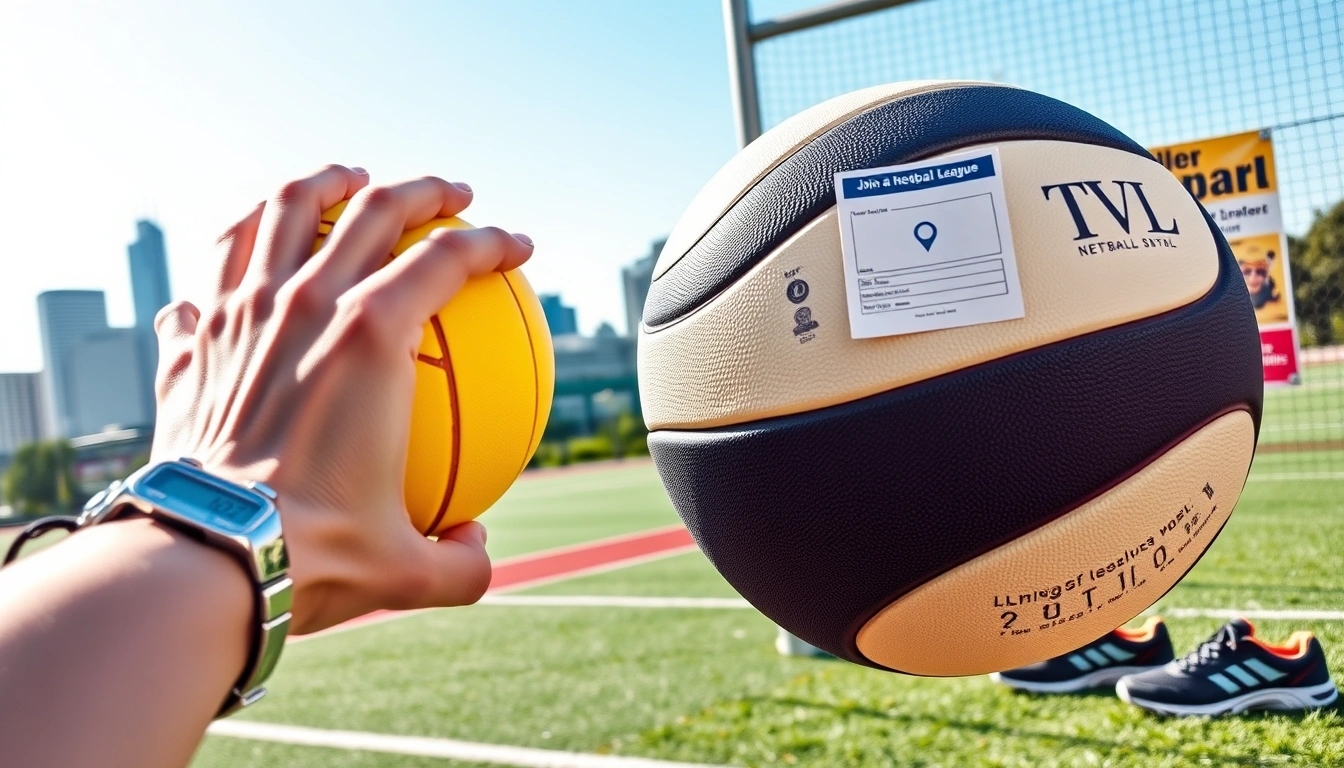Jumping into your local netball league might seem like a straightforward task, but trust me, there’s a bit more to it than just showing up and hoping for the best. Whether you’re a total newbie or dusting off your sneakers after a long break, getting started right can make all the difference between loving the game or regretting that impulse sign-up. Let’s break down the essentials to get you court-ready and part of the action.
Understand the Game First
Before you lace up, it’s smart to get a grip on the basics. Netball isn’t just “basketball without dribbling,” as some folks mistakenly think. It’s a fast-paced, strategic game with specific positions like Goal Shooter, Wing Attack, and Centre, each with unique roles and court boundaries. Knowing the rules—like the no-contact policy and the three-second holding rule—will save you from embarrassing fouls and awkward looks from teammates. If you’re clueless, YouTube tutorials or a quick chat with a player at your local sports shop can be a lifesaver.
Where to Find Your Tribe
Finding a league near you can be surprisingly easy or a bit of a wild goose chase, depending on your city. Start with community centers, local sports clubs, or even Facebook groups dedicated to netball enthusiasts. Many cities have dedicated netball associations with websites listing teams, schedules, and registration info. Don’t overlook word-of-mouth either—sometimes the best teams aren’t the ones plastered all over the internet but those that thrive on neighborhood buzz.
| Resource | What You’ll Find | Tip |
|---|---|---|
| Community Centers | Bulletin boards, team posters, info sessions | Visit during peak hours for more chances to meet players |
| Netball Association Websites | Official league listings, registration deadlines | Bookmark and check regularly for updates |
| Social Media Groups | Casual team invites, player discussions | Engage by commenting or posting questions |
Size Up Your Skills
Not everyone is ready to jump into the premier league straight away (spoiler alert: most aren’t). Be honest about your skill level. Are you comfortable passing and catching under pressure? Can you keep up with the pace? Some leagues have divisions or beginner teams, so finding the right fit keeps things fun and avoids getting steamrolled by pros. If you’re unsure, attend open training sessions or watch a few games to gauge where you might slot in.
Reach Out Without Feeling Awkward
Contacting coaches or team captains can feel like asking someone out on a date—awkward and full of “what ifs.” Keep it casual and confident. A simple message like, “Hi, I’m interested in joining your team and would love to know about tryouts or practice times,” works wonders. Avoid over-explaining or apologizing for being a newbie; enthusiasm goes a long way.
- Tip 1: Use email or social media for first contact; it’s less intimidating.
- Tip 2: Prepare a few questions to show genuine interest.
- Tip 3: Don’t be discouraged if you don’t get an immediate response—persistence is key.
Paperwork and Fees—The Boring But Necessary Stuff
Once you’ve found your team, expect a bit of admin. Registration usually involves filling out forms, paying fees (think uniforms, league dues), and submitting any required medical info. Deadlines can sneak up fast, so don’t procrastinate. Some leagues offer flexible payment plans, so ask if money’s tight.
Game Day Gear
Forget fancy sneakers that cost a fortune; you just need comfortable, supportive shoes with good grip. Most netball players swear by breathable sportswear and a water bottle that doesn’t leak all over your bag. Oh, and don’t underestimate the power of a good sweatband or ankle support if you’re prone to twists.
Joining a netball league is as much about the camaraderie as it is about the game. So, get out there, make some friends, and remember—it’s okay to fumble a bit. Everyone started somewhere, and the court is where the fun really begins.
Understanding Netball Basics
So, you’re thinking about diving into the world of netball, huh? Good on you! But before you lace up those sneakers and storm the court like a pro, it’s smart to get a grip on the basics — the rules, the positions, and what the heck you’re actually signing up for. Netball isn’t just “basketball’s cousin,” it’s got its own vibe, and knowing the ropes makes the whole experience way more fun and less confusing. Let’s break it down.
The Rules — What’s Allowed and What’s Not
Netball is a fast-paced game played by two teams of seven players each, aiming to score goals by shooting a ball through a hoop. But here’s the kicker — unlike basketball, no dribbling allowed! The ball has to be passed around by hand, and players can only hold the ball for three seconds before passing it on. Oh, and you can only take one step while holding the ball, so no fancy footwork like in other sports.
- No contact: Physical contact is a big no-no. If you bump into someone, expect a whistle and a penalty.
- Offside rules: Each player has a specific area on the court they can be in — wander off, and you’re out of bounds.
- Scoring: Only the Goal Shooter (GS) and Goal Attack (GA) can shoot, and only from inside the shooting circle.
Positions — Who Does What?
Every player has a role to play, literally. The court is split into thirds, and each position is restricted to certain areas. Here’s a quick cheat sheet:
| Position | Main Role | Allowed Court Areas |
|---|---|---|
| Goal Shooter (GS) | Score goals | Shooting circle and attacking third |
| Goal Attack (GA) | Score and assist | Shooting circle, attacking third, center third |
| Wing Attack (WA) | Feed the shooters | Attacking third, center third (not shooting circle) |
| Center (C) | Link defense and attack | All thirds except shooting circles |
| Wing Defense (WD) | Mark WA, stop attacks | Defending third, center third (not shooting circle) |
| Goal Defense (GD) | Mark GA, defend goal | Defending third, shooting circle, center third |
| Goal Keeper (GK) | Mark GS, defend goal | Defending third and shooting circle |
Honestly, it might sound like a lot to remember, but once you’re on the court, it clicks. The positions aren’t just about standing around — they shape your whole game strategy.
Quick Tips Before You Start
- Don’t freak out over the rules. Everyone messes up at first — even the seasoned players.
- Watch a few games online or in person to see how players move and communicate.
- Ask questions! Coaches love it when newbies show interest, even if the questions seem silly.
So, to wrap this up — netball is a brilliant mix of speed, skill, and smarts. Knowing the basics will save you from embarrassing yourself on day one and help you enjoy every second of the game. Ready to jump in? The court is waiting.
Finding Local Netball Leagues
So, you’ve decided to dive into the exhilarating world of netball but scratching your head wondering, “Where on earth do I find a league to join?” Don’t sweat it! Locating netball leagues in your city is easier than you think, once you know where to look. Let’s break it down with some insider tips and practical pointers — no fluff, just the good stuff.
First off, the internet is your best friend here. Websites like Meetup, local sports club directories, and even Facebook groups dedicated to netball can be gold mines. Just pop in “netball leagues near me” or “community netball clubs” into your search engine, and you’ll be swimming in options. Sometimes, smaller towns or neighborhoods have their own Facebook pages where leagues post updates and call for new players.
- Online Platforms: Meetup.com, Eventbrite, local sports forums
- Social Media: Facebook groups, Instagram pages of local sports clubs
- Official Sports Bodies: Check your city or state’s netball association website
But hey, not everything is online. Community centers and local gyms often have bulletin boards plastered with flyers about upcoming netball leagues or pick-up games. Don’t underestimate the power of a good old-fashioned chat with the receptionist or coach at these places — they usually know the scoop.
| Resource Type | Where to Look | Why It Helps |
|---|---|---|
| Online Directories | Meetup, local sports websites | Quick access to multiple leagues and events |
| Social Media | Facebook groups, Instagram | Community interaction and real-time updates |
| Community Centers | Bulletin boards, staff info | Local, grassroots level leagues |
| Sports Associations | Official netball bodies’ websites | Reliable and organized league info |
Now, here’s a little nugget of wisdom: sometimes leagues aren’t actively advertising because they rely on word-of-mouth. So, chat up your friends, coworkers, or neighbors — you never know who’s already in a team or knows where to find one. Networking is underrated but can be a game-changer.
Oh, and if you’re feeling adventurous, try dropping by a local game or practice session. Watching the action live and talking to players can give you a feel for the vibe and whether the league suits your style. Plus, it’s a great way to break the ice and maybe even get invited to join on the spot!
Quick Tips for Finding Your Netball League:- Use multiple online platforms to widen your search- Visit community centers and gyms in person- Reach out to local netball associations for official info- Don’t underestimate the power of word-of-mouth- Attend a game or practice session to get a real feel
So, to wrap it up — finding a netball league is a bit like hunting for treasure. You’ve got to poke around, ask questions, and maybe get your hands a little dirty. But once you find your squad, the thrill of the game and the camaraderie make it all worth it. Now, lace up those trainers and get ready to hit the court!

Assessing Your Skill Level
Alright, before you dive headfirst into the whirlwind world of netball leagues, it’s crucial to take a moment and honestly figure out where you stand skill-wise. No one wants to be that player who’s totally out of their depth or, conversely, the star player stuck on a team that’s too slow-paced. Getting a grip on your netball abilities helps you pick the right team or division that matches your experience, saving you from awkward mismatches and boosting your enjoyment on the court.
So, how do you size yourself up without sounding like you’re bragging or downplaying your skills? Start by reflecting on your past experiences. Have you played netball before? Maybe in school, a casual weekend group, or even just shooting hoops with friends? If you’re a complete newbie, that’s fine too – recognizing that is half the battle.
- Beginner: New to netball or have very limited experience. Still learning the basic rules and positions.
- Intermediate: Comfortable with most rules, understand positions, and have some game experience under your belt.
- Advanced: Skilled player with strong game sense, good fitness, and consistent performance in competitive matches.
Next, think about your physical fitness and agility. Netball isn’t just standing around waiting for the ball – it’s quick sprints, sharp passes, and solid defense. If you’re gasping for air after a few minutes, you might want to start with a lower division or a beginner team while you build stamina.
One neat trick is to ask for feedback from someone who’s familiar with the game—maybe a coach, a friend who plays regularly, or even a teammate from a casual game. They can often spot strengths and weaknesses you might miss. Don’t be shy! Honest feedback is gold.
| Skill Aspect | Beginner | Intermediate | Advanced |
|---|---|---|---|
| Understanding of Rules | Basic | Good | Excellent |
| Passing Accuracy | Inconsistent | Reliable | Precise under pressure |
| Fitness Level | Needs improvement | Moderate | High |
| Position Knowledge | Learning | Comfortable | Expert |
Now, if you’re feeling a bit lost about what division to join, here’s a quick tip: most leagues have multiple divisions or skill tiers for a reason. Don’t be tempted to jump straight into the top division just because you want to impress. It’s better to start where you can contribute and grow. Trust me, there’s no shame in starting slow. Everyone’s been there.
Also, consider attending a few practice sessions or scrimmages before committing. This gives you a real feel for the pace and skill level expected. Sometimes, the best way to figure out where you fit is by simply getting out there and playing.
Finally, keep in mind that skill assessment isn’t a one-and-done deal. As the season progresses, your abilities will evolve. Stay open to feedback and be ready to move divisions or teams if needed. The key is to find the sweet spot where you’re challenged but not overwhelmed.
Practical Steps to Assess Your Netball Skills:1. Reflect on your past playing experience.2. Rate your understanding of rules and positions.3. Evaluate your fitness and agility honestly.4. Seek feedback from experienced players or coaches.5. Attend practice sessions or scrimmages.6. Choose a division that matches your current level.7. Reassess regularly and adjust as needed.
So, take a deep breath, be honest with yourself, and remember: netball is about having fun and improving. Your perfect team is out there waiting for you to bring your unique style to the court.
Contacting Teams and Coaches
Alright, so you’ve decided to dive into the world of netball and you’re itching to join a team. But here’s the kicker — reaching out to team managers or coaches can be a bit of a tightrope walk. You want to come across as eager and interested, but not like you’ve just stumbled onto their email by accident and are begging for a spot. So, how do you strike that perfect balance? Let’s break it down.
First things first: Do your homework. Nothing screams “clueless” louder than a message that shows zero knowledge about the team or league. Before you even think about hitting send, spend some time learning about the team’s recent games, their style, or even the coach’s background if you can find it. It’s like showing up to a job interview without knowing what the company does — awkward and avoidable.
- Tip 1: Start with a clear introduction. Mention your name, your experience level (even if it’s beginner, own it!), and why you’re interested in their team.
- Tip 2: Keep it concise but meaningful. Coaches and managers are busy folks. They don’t want to read a novel, but they do want to know you’re serious.
- Tip 3: Ask smart questions. Instead of “Can I join?” try “Are there any upcoming tryouts or practice sessions I could attend to learn more?” This shows initiative without sounding desperate.
Now, here’s a little secret: tone matters. You want to sound confident but not cocky, interested but not needy. Imagine you’re chatting with someone in person — you wouldn’t beg, but you’d show enthusiasm and respect their time.
| Don’ts | Dos |
|---|---|
| “Please pick me! I’ll do anything!” | “I’m really passionate about netball and would love to contribute to your team.” |
| Sending multiple follow-up messages in one day | Wait at least a week before a polite follow-up |
| Using slang or overly casual language | Maintain professionalism but be friendly |
Oh, and don’t forget about the power of timing. Avoid contacting coaches right before or after a big game when they’re likely swamped. Mid-week afternoons are often a safer bet.
Finally, if you don’t hear back immediately, don’t panic. Coaches get tons of messages, and sometimes your note might get buried. A polite follow-up after a week or so is perfectly acceptable — just don’t turn into a pest.
In summary, reaching out to teams and coaches isn’t rocket science, but it does require a bit of finesse. Be prepared, be polite, and most importantly, be yourself. If you show genuine interest and respect, you’ll stand a much better chance of catching their eye than if you come across as clueless or desperate.
Registration Process Explained
Jumping into a netball league might sound straightforward, but trust me, the registration process can be a bit of a maze if you’re not prepared. So, buckle up as we break down what you need to have ready, what fees you’re likely to face, and when exactly you need to get your act together before the season kicks off.
First things first: paperwork. Don’t expect to just show up and say, “Hey, I want in!” Most leagues require a registration form that’s more detailed than your average dating profile. You’ll need to provide basic info like your name, contact details, and emergency contacts (because, well, netball can get intense). Some leagues might ask for a medical clearance or a signed waiver, basically a “don’t sue us if you trip” kind of deal. It’s usually a good idea to scan or photocopy these documents too, because losing your paperwork is a rookie mistake.
Now, let’s talk fees. This is where wallets might start to sweat. League fees vary wildly depending on the level of competition and facilities. Expect to pay anywhere from $50 to $150 or more per season. Sometimes, this fee covers everything – court hire, referees, and even a team jersey. Other times, you’ll be shelling out extra for gear or insurance. Pro tip: check if there’s a late registration fee because procrastinators beware!
| Item | Typical Cost | Notes |
|---|---|---|
| Registration Fee | $50 – $150 | Depends on league and location |
| Uniform/Jersey | $20 – $60 | Some leagues provide, others don’t |
| Insurance | $10 – $30 | Often mandatory |
| Late Fee | $10 – $30 | Avoid if possible! |
Deadlines are a pain, but they’re crucial. Most leagues set a firm cutoff date for registration, often a few weeks before the first game. Why? Because organizers need time to sort teams, schedules, and referees. Missing the deadline usually means you’re out of luck or stuck on a waitlist. So, mark your calendar, set a reminder on your phone, tie a string around your finger—whatever it takes.
- Step 1: Find the registration form online or at the league office.
- Step 2: Fill out all required info, double-check for typos (nobody wants to call you “Netball Noob”).
- Step 3: Gather necessary documents like ID, medical forms, and waivers.
- Step 4: Pay the fees—online, in person, or by carrier pigeon (okay, maybe not the last one).
- Step 5: Submit everything before the deadline and cross your fingers.
One last nugget of wisdom: keep copies of all your paperwork and payment receipts. It’s a small step that can save you hours of headache if something goes sideways. And hey, if you’re feeling overwhelmed, don’t hesitate to reach out to the league coordinator. They’ve seen it all and can usually help you dodge the common pitfalls.
So, while signing up might feel like jumping through hoops, once you’ve nailed the registration, the real fun begins—getting out there and smashing those netball goals!

What to Expect at Tryouts
So, you’ve decided to throw your hat in the ring and try out for a netball league in your city. First off, good on you! But let’s be real — tryouts can be a mixed bag of excitement, nerves, and a little bit of chaos. Here’s the lowdown on what to expect and how to not completely flop.
- Warm-Up Drills: Don’t just stroll in like it’s a casual Sunday stroll. Coaches want to see you move — fast feet, sharp turns, and stamina. Expect some jogging, shuttle runs, and ball-handling drills. It’s not just about looking good; it’s about showing you can keep up when the game heats up.
- Skill Tests: Passing, shooting, intercepting — they’ll want to see all these in action. Pro tip: don’t just lob the ball; show control and accuracy. Remember, coaches are looking for players who can think on their feet, so be ready to adapt if the drill changes mid-way.
- Game Simulation: This is where things get interesting. You’ll be put in mini-matches or scrimmages. It’s not about scoring the most goals but how well you communicate, position yourself, and work with teammates. If you’re the one hogging the ball or standing still, expect some frowns.
| What Coaches Look For | Why It Matters |
|---|---|
| Attitude and Coachability | Are you open to feedback or just stubbornly doing your own thing? A good attitude can sometimes trump raw skill. |
| Fitness Level | Netball is fast-paced. If you can’t keep up, it’s a no-go. |
| Teamwork | Can you pass, communicate, and support teammates? Coaches want team players, not solo acts. |
| Position Awareness | Do you understand your role on the court and stick to it? Playing out of position can mess up the whole team. |
Now, about attitude — seriously, it’s not just a buzzword coaches throw around. Showing up on time, being respectful, and having a “let’s do this” mindset can make a huge difference. If you’re that person rolling in late, complaining, or sulking after a mistake, you’re not winning many hearts.
And don’t get too hung up on nerves. Everyone’s got ‘em. The trick is to channel that jittery energy into focus. Take deep breaths, listen carefully, and remember why you wanted to play in the first place — because netball’s fun, duh!
Practical Tryout Tips:- Get a good night’s sleep before the big day.- Bring water and a snack; you’ll need the energy.- Wear comfortable, appropriate sports gear.- Practice basic drills at home to feel confident.- Don’t be afraid to ask questions if you’re unsure.
Finally, keep in mind that tryouts aren’t the end-all-be-all. If you don’t make the cut this time, it’s not the end of the world. Use the experience to learn, improve, and come back stronger. Netball leagues are always looking for passionate players who show grit and growth potential.
So, lace up, breathe deep, and get ready to give it your all. The court’s waiting — and who knows? This could be the start of something awesome.
Choosing the Right Gear
Jumping into netball without the right gear? That’s like trying to bake a cake without flour—sure, you might get something edible, but it won’t be pretty or effective. So, before you lace up those shoes and hit the court, let’s talk about what you actually need and, more importantly, where to grab it without giving your wallet a heart attack.
First off, footwear is king. Netball demands quick pivots, sudden stops, and explosive sprints. So, those old sneakers from your last failed gym phase? Yeah, toss ‘em. You want shoes with solid ankle support and a grippy sole to avoid looking like Bambi on ice. Brands like Asics and Nike have decent options, but if you’re on a budget, check out clearance sales or even second-hand sports stores. Sometimes, you can snag barely-used pairs for a fraction of the cost.
| Gear Item | Purpose | Budget-Friendly Tips |
|---|---|---|
| Netball Shoes | Support and traction for quick movements | Look for sales, outlet stores, or gently used options |
| Uniform (Dress/Skirt & Top) | Comfort and team identification | Buy from team bulk orders or online discount retailers |
| Sports Socks | Cushioning and sweat absorption | Multi-packs from discount stores work fine |
| Protective Gear (Knee/Ankle Braces) | Prevent injuries during intense play | Only if needed; check second-hand or sports outlets |
| Water Bottle | Stay hydrated during games | Reusable bottles from supermarkets or dollar stores |
Now, about the uniform: most leagues require a specific dress or skirt and top combo. Don’t just grab the first flashy outfit you find. Comfort is key—breathable fabrics that wick sweat away will save you from feeling like a soggy mess halfway through the second quarter. Pro tip? Bulk orders through your team can slash costs dramatically, so rally your teammates before buying.
Oh, and socks—don’t underestimate ‘em. Proper sports socks prevent blisters and keep your feet dry, which is a blessing when you’re sprinting up and down the court. You can find affordable multi-packs at discount stores; no need to splurge here.
- Bonus Gear: If you’re injury-prone or just cautious, ankle or knee braces might be worth the investment. But hey, if you’re just starting out, maybe hold off until you know what your body really needs.
- Hydration Station: Always have a water bottle handy. You don’t want to be that person gasping for air on the sidelines.
Wondering where to shop? While specialty sports stores are great for quality, they can be pricey. Online marketplaces like Amazon or eBay often have competitive prices, but watch out for fake or low-quality gear. Local thrift shops and community sports swaps can be hidden gold mines for gently used equipment. And don’t forget about social media groups—sometimes fellow players sell or trade gear for cheap.
In summary, gearing up for netball doesn’t have to drain your bank account. Be smart, shop around, and prioritize comfort and safety over flashy looks. Because trust me, no one’s impressed by your neon shoes if you’re hobbling off the court after five minutes.
Quick Tips Recap:
- Invest in good shoes—your ankles will thank you.
- Buy uniforms in bulk or secondhand to save cash.
- Don’t skimp on socks; they’re small but mighty.
- Consider protective gear only if necessary.
- Hydrate like your game depends on it—because it does.
Ready to gear up and dominate the court? Now that you know what to look for and where to find it, there’s no excuse to show up unprepared. Get out there and play hard!
Training and Practice Tips
Alright, so you’ve decided to get serious about netball, huh? Whether you’re flying solo or rolling deep with your team, training smart is the name of the game. Let’s cut through the fluff and get into how you can seriously up your netball skills without losing your mind or your weekends.
First off, consistency beats intensity. Trying to cram a month’s worth of training into a weekend? Yeah, that’s a one-way ticket to burnout city. Instead, carve out manageable chunks of time during the week. Even 20-30 minutes daily focused on specific skills can make a world of difference.
- Solo Drills: Don’t have a team to practice with? No sweat. Work on your footwork using ladder drills or cone sprints to boost agility. Practice your passing against a wall—yes, it sounds odd, but your accuracy and timing will thank you.
- Fitness Focus: Netball isn’t just about fancy passes; endurance and speed matter. Mix in some interval training—think short bursts of sprinting followed by a jog—to mimic game conditions.
Now, if you’re training with your crew, communication is key. Nothing kills a practice session faster than everyone doing their own thing. Set clear goals for each session. Maybe today is all about shooting accuracy, tomorrow’s about defensive positioning. Keep it varied to avoid boredom.
| Practice Focus | Drill Example | Why It Helps |
|---|---|---|
| Passing | Partner chest passes with increasing speed | Improves reaction time and precision under pressure |
| Shooting | Spot shooting from different court positions | Builds muscle memory and confidence |
| Defence | Shadow drills to mimic opponent movement | Enhances anticipation and footwork |
Here’s a little insider tip: video yourself during practice. Watching your own moves can be a real eye-opener. You might catch that you’re always leaning left or that your passes are a tad too high. It’s like having your own personal coach without the awkward shouting.
Don’t forget the mental side either. Netball is fast, and your brain needs to keep up. Try visualizing game scenarios during downtime. Picture yourself intercepting a pass or nailing that last-second shot. It sounds a bit woo-woo, but hey, if it helps, why not?
- Recovery Matters: No one’s a robot. Stretch, hydrate, and get decent sleep. Skipping recovery is like trying to drive a car without oil—eventually, something’s gonna break down.
- Mix It Up: Boredom is the enemy. Switch between drills, add some fun mini-games, or challenge your teammates to skill contests. Keeps the vibe fresh and competitive.
Lastly, don’t be too hard on yourself. Progress isn’t always linear. Some days you’ll feel unstoppable, others you’ll fumble like it’s your first time on the court. Keep at it, laugh off the mistakes, and remember why you started playing in the first place.
So, whether you’re flying solo or squad deep, training smart, staying consistent, and keeping it fun will have you smashing your netball goals before you know it.

Understanding the League Schedule
Jumping into a netball league is exciting, but let’s be honest: the schedule can sometimes feel like a puzzle you’d rather not solve. Most leagues tend to set their games on fixed days—usually weekday evenings or weekends. Why? Because, well, that’s when most folks aren’t stuck at work or school. But here’s the kicker: these schedules aren’t always carved in stone. Weather delays, venue availability, or even last-minute changes by the league organizers can throw a wrench in your plans. So, flexibility? Yeah, you’re gonna need it.
- Typical Game Days: Weeknights (like Tuesday or Thursday) and weekends are the prime time slots.
- Game Duration: Usually, matches last about an hour, but factor in warm-ups and post-game chats.
- Season Length: Most leagues run for 8-12 weeks, with playoffs or finals at the end.
Now, balancing these games with your personal life? That’s where things get tricky. Imagine this: you’ve got a game on a Thursday at 7 PM, but your boss just scheduled a last-minute meeting at 6:30 PM. Or maybe your kid’s school play is on the same weekend as a crucial match. It happens. Life throws curveballs, and netball schedules don’t always play nice with your calendar.
| Challenge | Possible Solution |
|---|---|
| Conflicting work commitments | Communicate early with your employer; swap game days if the league allows |
| Family events overlapping with games | Plan ahead; ask teammates if you can catch a later game or be subbed out |
| Sudden schedule changes | Keep your phone notifications on for league updates; join team group chats |
The secret sauce to managing this balancing act? Communication and a dash of prioritization. Let your teammates know if you might miss a game or arrive late. Most teams appreciate honesty over disappearing acts. Also, some leagues are more flexible than others—if you find one that’s super rigid, maybe it’s time to scout for a different league that fits your lifestyle better.
And hey, don’t forget the mental juggling here. Juggling work, family, social life, and netball can feel like spinning plates. But here’s a little nugget: participating in a league isn’t just about competition; it’s a social outlet, a stress buster, and a way to keep active. So, when the schedule looks daunting, remind yourself why you signed up in the first place.
Pro Tips for Scheduling Success:- Sync your game days with your digital calendar ASAP.- Set reminders for registration deadlines and game days.- Build a support network—friends or family who get your netball obsession.- Don’t be afraid to say no to extra commitments during the season.
In short, understanding the league schedule is half the battle. The other half? Making it work for you without losing your sanity or missing out on the fun. Netball’s supposed to be a blast, not a burden—so plan smart, communicate openly, and keep your eye on the ball (both literally and figuratively).
Remember: No league schedule is perfect, but with a little patience and some savvy planning, you’ll be smashing those games and balancing life like a pro in no time.
Building Team Chemistry
Building Team Chemistry: Why Bonding Off the Court Matters and Fun Ways to Connect with Your Teammates
Alright, let’s be real for a sec—netball isn’t just about those slick passes or nailing that perfect shot. Sure, skills matter, but if your team vibes are off, it’s gonna show on the court like a bad haircut. is the secret sauce that turns a group of individuals into a squad that clicks, trusts, and fights for each other. And guess what? This magic doesn’t just happen during training or matches. Nope, it’s all about what goes down off the court.
Why bother bonding outside the game? Because when teammates know each other beyond just their positions and stats, communication flows smoother, trust deepens, and even the messiest plays get forgiven. Plus, it’s way more fun to hang out with people you actually like, right? Imagine trying to celebrate a win or console each other after a loss when everyone’s just polite strangers. Awkward.
- Trust-building: When you share stories, jokes, or even a pizza, you build trust. And trust means players are more willing to cover for each other’s mistakes or push a little harder.
- Better communication: Knowing your teammate’s quirks and moods helps you read their moves better on the court.
- Boosted morale: Good vibes off the court translate to positive energy during games.
Now, you might be thinking, “Okay, but how do we actually bond without it feeling like a boring team-building exercise from work?” Fear not, here are some fun and low-key ways to connect that don’t involve trust falls or awkward icebreakers.
| Activity | Why It Works | Pro Tip |
|---|---|---|
| Group dinners or potlucks | Food brings people together, and sharing meals sparks casual conversations | Rotate who picks the cuisine to keep things interesting |
| Movie or game nights | Relaxed environment helps teammates unwind and bond over shared interests | Pick a mix of genres or games so everyone gets a turn |
| Mini challenges or friendly competitions | Creates playful rivalry and teamwork outside netball | Keep it lighthearted to avoid bruised egos |
| Volunteering together | Giving back creates a strong sense of unity and purpose | Choose causes everyone cares about to maximize engagement |
And hey, bonding doesn’t have to be a big production. Sometimes, it’s just about those little moments—chatting after practice, sharing memes in the team group chat, or celebrating birthdays with a surprise cake. These seemingly small things build a foundation that makes the team more than just a collection of players.
Tips for Successful Team Bonding Off the Court:- Be inclusive: Make sure no one feels left out.- Keep it casual: Don’t force it; let connections grow naturally.- Mix it up: Try different activities to cater to everyone’s tastes.- Laugh a lot: Humor is the glue that holds teams together.
So next time you’re tempted to just head home after training, think twice. Grab a few teammates, hit that local café, or plan a chill hangout. Because at the end of the day, the strongest teams aren’t just the most skilled—they’re the ones who genuinely enjoy each other’s company. And trust me, your game will thank you for it.
Handling Wins and Losses
Jumping into the rollercoaster world of competitive netball means you’re signing up for some serious emotional whiplash. One minute, you’re riding high on a sweet victory, chest puffed out like a proud rooster, and the next, you’re staring down the barrel of a crushing loss wondering if you should just take up knitting instead. Keeping your cool through these ups and downs? Yeah, it’s easier said than done. But hey, it’s not impossible either.
First off, let’s talk about winning. When your team nails that perfect pass or sinks a goal in the last seconds, it’s tempting to let the ego run wild. But here’s the kicker: celebrating is great, but don’t let it go to your head. Overconfidence can be a sneaky little devil that bites you right back in the next game. Instead, savor the moment, high-five your mates, and then get back to work. Remember, every win is just one chapter in a long season, not the whole story.
| Tips to Handle Wins |
|---|
| Celebrate briefly but stay humble. |
| Analyze what worked to replicate success. |
| Encourage teammates to keep morale high. |
| Keep training to avoid complacency. |
Now, losses. Ugh, losses. Nobody likes them, but they’re part of the game. The trick is not to let a bad game spiral into a full-blown meltdown. It’s okay to feel disappointed—heck, you’re human—but don’t let that disappointment turn into blaming teammates, coaches, or the universe. Instead, try to see losses as lessons disguised in ugly uniforms. What went wrong? What can you do better? And most importantly, don’t dwell on mistakes that you can’t change.
- Take a deep breath and cool off before reacting.
- Discuss mistakes constructively with your team.
- Focus on improvement rather than dwelling on failure.
- Remember why you play—for fun, fitness, and friendships.
Here’s a quick reality check: netball, like any competitive sport, is a mix of chaos and control. You can’t control every pass, every bounce, or every referee call. What you can control is your attitude. Keeping your mind sane means learning how to bounce back quickly, whether that’s through a post-game chat, a laugh with your mates, or just zoning out with some music.
Handling Wins & Losses Cheat Sheet:- Win: Enjoy but stay grounded.- Win: Analyze & learn.- Loss: Don’t blame, reflect.- Loss: Stay positive & supportive.- Always: Keep team spirit alive.
So yeah, managing the emotional rollercoaster of competitive netball isn’t just about physical skill—it’s a mental game too. If you can keep your head when everyone else is losing theirs, you’re already halfway to being a champion. And hey, if all else fails, just remember: even the best players have off days. The trick is to keep showing up, lace up those sneakers, and give it your all—no matter what the scoreboard says.
Stay cool, stay focused, and keep loving the game.

Staying Motivated Throughout the Season
Alright, so you’ve laced up your shoes, slapped on your bib, and dived headfirst into the netball season. But let’s be real — enthusiasm can dip faster than a missed shot in the final quarter. Keeping that fire burning from the first whistle to the final buzzer isn’t always a walk in the park. Sometimes, it’s downright tough. So here’s the lowdown on how you can keep your mojo intact, even when the scoreboard isn’t exactly smiling your way.
First off, set yourself some mini-goals. No, not the “win the championship” kind — those are for dreamers and pressure addicts. Think smaller, like nailing your footwork, or improving your passing accuracy by 10%. These bite-sized wins make the season feel less like an endless slog and more like a series of achievable steps.
| Mini-Goals Ideas | Why They Work |
|---|---|
| Improve your shooting accuracy by 15% | Gives you a clear target and measurable progress |
| Attend 80% of team practices | Builds consistency and shows commitment |
| Learn one new play each week | Keeps things fresh and sharpens game sense |
Now, let’s talk about the mental game. It’s easy to get bogged down by losses or a couple of bad performances. Here’s a little secret: even the pros have “off” days. What separates the legends from the rest is how they bounce back. So, don’t be too hard on yourself. Instead, try keeping a motivation journal or a highlight reel of your best plays and moments. When you’re feeling meh, flip back through it — instant mood booster.
- Tip 1: Surround yourself with positive teammates who lift you up, not drag you down.
- Tip 2: Mix up your training routine to avoid boredom; try yoga or swimming for recovery.
- Tip 3: Celebrate small victories — yes, even that sneaky interception counts!
And oh, don’t underestimate the power of fun. Netball isn’t supposed to feel like a chore. Organize casual social events, team dinners, or even goofy practice drills. Laughing together builds chemistry and makes you actually look forward to showing up.
Sample Weekly Motivation Plan:Monday: Set your goals for the week.Wednesday: Midweek check-in – how are you tracking?Friday: Review your wins and areas to improve.Saturday: Game day – bring the energy!Sunday: Rest, reflect, and recharge.
Look, staying motivated isn’t about being perfect or unstoppable. It’s about finding those sparks that keep you coming back, even when the going gets tough. So, grab your water bottle, rally your teammates, and remember why you fell in love with netball in the first place. The season’s long, but your passion can be longer.
Frequently Asked Questions
- What is the best way to find a netball league in my city?
Finding a local netball league is easier than you think! Start by checking community centers, sports clubs, and online platforms like Meetup or Facebook groups dedicated to netball. Local sports shops often have bulletin boards with league info too. Don’t hesitate to ask around—sometimes the best teams are found through word of mouth!
- Do I need to be highly skilled to join a netball league?
Not at all! Netball leagues usually have divisions for all skill levels, from beginners to advanced players. Assess your skills honestly, but remember that everyone starts somewhere. Joining a beginner-friendly team is a fantastic way to learn, have fun, and build confidence on the court.
- How do I contact team coaches without sounding awkward?
Keep it simple and genuine. Introduce yourself, express your interest in joining, and ask about tryouts or practice sessions. Coaches appreciate enthusiasm and honesty. Think of it like sending a friendly text to a new teammate—no need to overthink it!
- What should I expect during netball tryouts?
Tryouts are your chance to shine, but they’re also about showing teamwork and a positive attitude. Be ready for drills that test passing, shooting, and agility. Remember, coaches look for potential and how well you gel with others, not just raw talent.
- What gear do I absolutely need to start playing netball?
At minimum, you’ll want comfortable sportswear, supportive trainers with good grip, and a netball. Optional but helpful items include ankle braces and sweatbands. You don’t need to splurge—many affordable options offer great quality. Think of your gear as your game-day armor!
- How can I balance netball games with my personal schedule?
Netball leagues usually schedule games weekly or biweekly, often in the evenings or weekends. It helps to plan ahead and communicate with your team if conflicts arise. Treat your netball time like an important appointment—it’s your chance to unwind and connect.
- What’s the best way to stay motivated throughout the season?
Keep your eyes on the prize but enjoy the journey. Celebrate small wins, set personal goals, and lean on your teammates for support. Mixing in fun activities off the court can also boost team spirit and keep your enthusiasm exploding like a firework!













